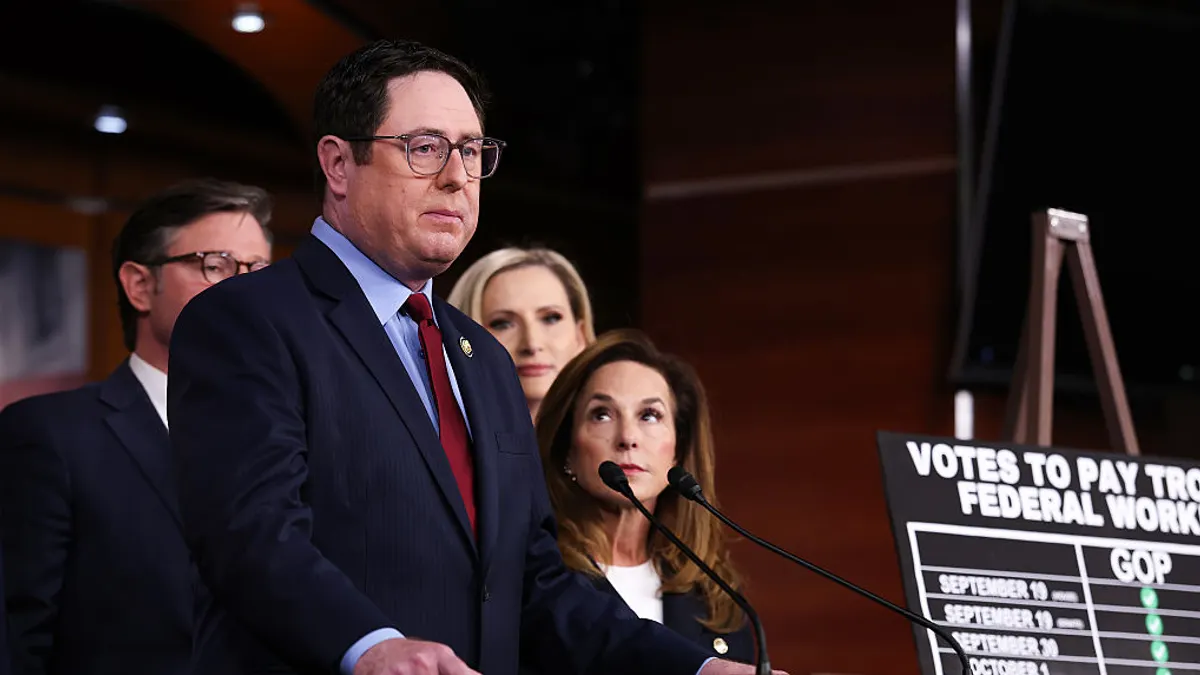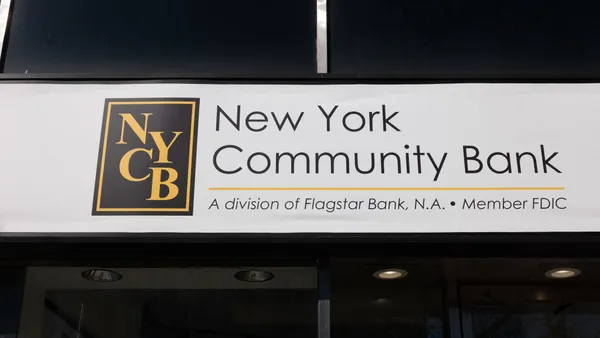LAS VEGAS – Small banks can’t ignore stablecoins if they want to remain competitive, Rep. Mike Flood, R-NE, said Sunday at the Money20/20 conference.
“If community banks want to survive, they have no choice but to be in this lane,” said Flood, a member of the House Financial Services Committee.
Flood, who shepherded cryptocurrency legislation at the state level in 2021, suggested banks can’t afford to lose more business, pointing to mortgage lending, which has largely moved outside the banking industry, as an example.
“And now some of their youngest customers are self-custodying assets,” Flood said Sunday during a fireside chat with Financial Technology Association CEO Penny Lee.
Small banks need to be in the stablecoin business, and to facilitate that, bank-fintech partnerships are essential, Flood said. Stablecoins are a type of cryptocurrency pegged to a fiat currency, such as the U.S. dollar.
The industry has been abuzz over stablecoins since the passage of the Genius Act — which establishes a regulatory framework for stablecoin issuers — earlier this year.
Now, banking leaders such as Bank of America CEO Brian Moynihan and lawmakers are pressing for the Senate’s passage of the corresponding Clarity Act, which would establish a stablecoin market structure. The House passed the bill in July.
Moynihan, speaking last week at the American Bankers Association convention, suggested the onus is on big banks to sort out the industry’s response to stablecoin interest and have products that are made available to banks of all sizes. Bank trade groups have expressed concern about deposit loss and want Congress to ensure there are limits on the yields stablecoins can offer consumers.
Flood noted the Genius Act’s bipartisan backing. “This was a negotiation. This is how Congress is supposed to work,” he said. “We didn't get everything we wanted. [Democrats] didn't get everything they wanted.”
Now, the focus is on the Clarity Act, which he said is essential to ensure consumer protection.
“The Genius Act is like a cell phone that has all the bells and whistles on it, but it's worthless if it's not connected to a network to allow you to use all of the different features on the phone,” Flood said.
“Without the Clarity Act, the Genius Act doesn't do enough to move us forward in an innovative way,” he said. “I feel like, now we get the government out of the way, we set our market structure up and let innovation blossom.”
He expects the Senate will take action on the Clarity Act, potentially even later this year. Still, as the government shutdown drags on, it’s not encouraging for near-term bipartisan progress, he noted.
“This is a really bad sign. It could be a really tough 13 months,” Flood said, referring to the amount of time before the midterm elections.
During the conversation with Lee, Flood also addressed fraud and the open banking debate between banks and fintechs.
“You ever see one of those huge fights and you're like, ‘I hope that never lands in my lap’? That would be one of those fights,” Flood said of the battle over open banking. “The Trump administration, we're hoping, finds very delicately the common ground between the competing parties.
“Ultimately, I think innovation is going to win here over the long term,” Flood said.
On fraud, Flood said lawmakers need to have a better understanding of the current status of fraud and scams and the implications for the industry, and banks of all sizes need to develop more of a unified front to thwart fraudsters.
He said he was astounded to recently hear of a small regional bank that recorded $414 million in profit last year, after losing $85 million to fraud.
“We don't pay our regulators enough to stay at the top of their game with some of the technology that's changing,” he said. “So we need to find people that believe in public service, we need to pay them what they're worth, and we need to get out of their way and let them work with you to prevent fraud.”












